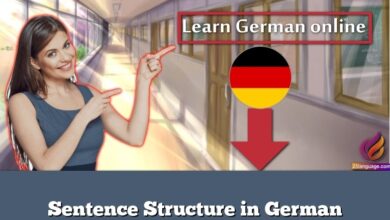Present Perfect Continuous Tense in German

Present Perfect Continuous Tense in German.The Present Perfect Continuous Tense is a fascinating grammatical structure in the English language. This tense sits at the intersection of the Present Perfect and the Present Continuous tenses, inheriting features from both and serving specific narrative and descriptive purposes.

Explanation about Present Perfect Continuous Tense in German
The Present Perfect Continuous Tense, known as “das Verlaufsform der vollendeten Gegenwart” in German, is a tense used in English to describe actions or situations that started in the past and have continued up to the present. This tense is not directly equivalent to any single tense in German, which generally uses other means to express similar concepts.
In English, the Present Perfect Continuous is formed by using the present perfect of the verb “to be” (have/has been) followed by the present participle of the main verb (the “-ing” form). For example: “I have been reading.”
To convey a similar meaning in German, you would often use the present tense along with an adverb to specify the duration or the starting point of the action. For example, to translate “I have been reading for two hours,” you might say: “Ich lese schon seit zwei Stunden.”
Alternatively, you could use the Perfekt tense to emphasize that an action has been completed up to a certain point but is relevant to or affects the present. For example: “Ich habe zwei Stunden gelesen,” could be used to emphasize that you spent two hours reading and you’re done now, but it’s relevant to the current conversation. However, this doesn’t capture the ongoing nature of the Present Perfect Continuous in English.
Examples for using Present Perfect Continuous Tense in German
| English (Present Perfect Continuous) | German Equivalent | Explanation |
|---|---|---|
| I have been reading for two hours. | Ich lese schon seit zwei Stunden. | Using Present Tense + “schon seit” to indicate duration. |
| She has been working at the company since 2010. | Sie arbeitet schon seit 2010 bei der Firma. | Using Present Tense + “schon seit” to indicate the starting point. |
| They have been playing football. | Sie spielen schon Fußball. | Using Present Tense + “schon” to indicate ongoing action. |
| We have been living in Berlin. | Wir wohnen schon in Berlin. | Using Present Tense + “schon” to indicate ongoing state. |
| You have been studying German. | Du lernst schon Deutsch. | Using Present Tense + “schon” to indicate ongoing action. |
Phrases about Present Perfect Continuous Tense in German
| English Phrase (Present Perfect Continuous) | German Equivalent Phrase | Explanation |
|---|---|---|
| Have been working on it | Arbeite schon daran | Using Present Tense + “schon” to indicate ongoing work |
| Has been raining | Regnet schon | Using Present Tense + “schon” to indicate ongoing condition |
| Have been feeling sick | Fühle mich schon krank | Using Present Tense + “schon” to indicate ongoing state |
| Have been living here | Wohne schon hier | Using Present Tense + “schon” to indicate ongoing state |
| Have been learning German for a year | Lerne schon seit einem Jahr Deutsch | Using Present Tense + “schon seit” to indicate duration |
| Has been eating | Isst schon | Using Present Tense + “schon” to indicate ongoing action |
| Have been studying all night | Lerne schon die ganze Nacht | Using Present Tense + “schon” + time expression for ongoing action |
In conclusion, the Present Perfect Continuous Tense is an integral and versatile part of English grammar. By sitting at the intersection of the Present Perfect and the Present Continuous tenses, it allows for nuanced expressions of actions or states that began in the past and continue into the present.






























